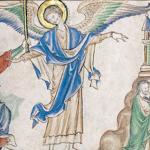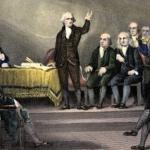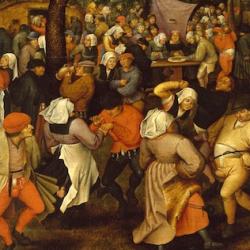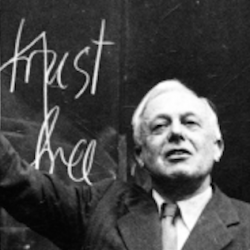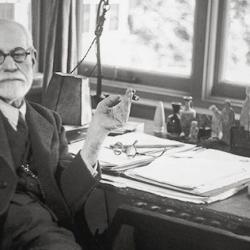Eugen Rosenstock-Huessy claims that the German Reformation qualifies for inclusion as one of the epochal revolutions of Western history (Out of Revolution).
This is so partly because the German Reformation gave to Europe a new social role, the civil servant: “In the German revolution the drab, grey life of the average bureaucrat was suddenly transformed as if by a great volcanic eruption. Graft, bribery, the spoils-system, stain the character of the civil servant in every country which has not been touched by this great revolution.”
In Germany, “the civil servant became a proud, leading character, the torch-bearer of a special form of European life, an organized unity.” As a civil servant, a man “took upon himself a new duty towards his mother earth” (362).
The creation of that role is enough to quality the Reformation as a genuine revolution in ERH’s book. But the Reformation also gave to Europe a periodization of its own history, the notion that the time between 600 and 1500 was a dark age: “The Pope had governed as the Anti-Christ, and had poisoned the real Christian gospel. A ‘new learning’ was begun by Luther and Melanchthon to restore the pure Pauline faith. Luther himself sometimes thought of being St. Paul redivivus.”
The change is astonishing: “For four hundred years St. Paul has been the symbol of a new church, fighting Petrine Rome and popery, preaching the gospel in the mother-tongue, and integrating Church and State, monasteries and hospitals, universities and schools everywhere, into one great organ of culture” (363).
Something “deep” must have been at work that would “make men discard a nine-hundred-year-old method.” This was not a “clergymen’s dispute” but a “revolution in the modern sense of the word: a breaking of all moulds, a pointing toward a new order of things, something totalitarian, universal in its aim, which had been unknown until then” (363).
According to Rosenstock-Huessy, Luther’s biography is not just about his contribution to the Reformation; Rosenstock says that the “German Reformation hinges on the personal biography of Martin Luther,” since through his life he formed a new human type, and pioneered a new form of Christian living. Within the biography of Luther is “a political earthquake.” Luther was “once for all,” but as a new human type he was the trailblazer for a new form of human life.
Concealing the political and cultural revolution of the Reformation within an individual biography reflects the German soul and helped to form it: “this strange subjectivism is generally recognized as the source of German strength and originality.” Specifically, Luther, together with the German prince’s of his time, contributed to the formation of the German civil servant, a man, he says, who “first hears the prophetic voice of universal truth, and who later enters the service of a secular authority to carry out his part in the Reform.”
The Reformation changed the relations among the hundreds of High Magistrates throughout Germany, forming them into “peers in a new government order.” Following the Reformation, the “‘German nation’ [was] embodied by its some hundreds of High Magistrates.” High Magistrates became responsible for their areas, without having to consult any higher authority, and this responsibility extended to religious affairs: “Every High Magistrate became a pope in his own big or little territory,” and, protected by the Emperor’s ring of territories, they “took up the Reformation in order to consolidate the administration of their own territories.”
Civil replaced ecclesiastical government, and the “civil servant appeared as a religious rival to the clergy.” Every citizen of Germany came to look “upon it as his birthright to live under the Civil Law,” a situation unknown in the middle ages, when men were counted either clergy or laity and under different legal systems accordingly. One effect of this trend was the separation of political and military authority. The High Magistrate was concerned with civil law and civil service, but responsibility for military matters lay elsewhere.
Luther’s life illustrates the shift from ecclesiastical to civil law. Originally a monk living under the jurisdiction of the Pope and Canon law, he moved under the prince’s jurisdiction when he left his “religious” vocation. The extension of civil law over all citizens provided an institutional covering for Luther to live and act and work while under papal condemnation. No other legal system protected Luther – not imperial law, not canon law, only the High Magistrate.
A new world emerged, a world in which men following Luther “had the courage to live under the curse of Rome and under the threats of all its minions.” This was the political import of justification by faith: Luther and his followers could stand against the condemnation of the world and the Roman church, confident of God’s favor. This placed Luther in a very different position from Hus, who was betrayed when the Emperor Sigismund broke his promise to provide safe conduct.
The question facing the High Magistrates of Germany in the Reformation was whether they had the right to question and challenge the church. If so, where did that right come from? The answer was to give authority of censorship to the universities, which, in the midst of conflicting schools and orders of the church, provided the intellectual and cultural unity in the various principalities.
Frederick the Wise, Rosenstock says, defended Luther as much to protect the rights of the university as to protect Luther himself, because in protecting the rights of the universities he was protecting the unity of his own realm. Because of Luther, Germany also “institutionalized” the role of prophet, a point that he illustrates by a lengthy quotation of a letter from Luther to Frederick of Saxony.
This maneuver involved the High Magistrate’s right to determine how far Canon and Imperial law applied within his realm. On the premise that governments could act in extraordinary ways in emergency situations, the High Magistrates took on the authority to decide religious matters. The original emergency that gave the modern state its powers was thus a religious emergency: “The secular state of the Reformation was the result of an emergency in religion and law.” For the Reformers, the Magistrate was the “beacon on the ocean of life,” when all the rest of Europe was in flux.
Of course, one of the great social effects of the Reformation arose from the doctrine of the priesthood of believers, and the breakdown of the rigid medieval clergy-lay distinction. This had, as Rosenstock explains in various places, enormous effects on family life, and it also had the effect of breaking down the security systems that Catholicism had offered. Luther, in fact, exhorted his followed to abandon “love of security” and to live in faith in the midst of insecurity.
Part of the security was the medieval sense that “the terrible debt of man to God to his Creator seemed to be redeemable in installments”; Luther destroyed this progressive notion, insisting that salvation was all or nothing – that God has us or he doesn’t. The Reformation was an attack on sorcery, and in destroying the various supports that medieval people had relied on – Mary, saints, the Pope, and more – He brought a “tremendous” darkness into Europe. In this state, “The new beacon of souls on the ocean of life was the Christian law of the High Magistrate,” who “regulated the civil order, marriage, property, trade, in the world of Christian states.”
Another political result of Luther’s work was the exaltation of the concept of “High” in German life: “The subject honours himself when he puts the secular authority as high as possible; for in bowing low before the prince he is fighting the pope and all priesthood. Luther abolished the institution of kneeling before the priest. Dutifulness, loyalty, the lust for obedience make the Lutheran; for all these characteristics are so many symbols of his fight against clerical domination.” The German “exaltation of the ‘State’” makes no sense unless it is seen as “rooted in the depreciation of the visible church.”
This had significant effects not only on the political order of Germany but on the church: “The balance between Church and monarchy has been upset because the Church has ceased to be real. For that reason German Protestantism has become shallow.” As a result, Protestants make good civil servants: “The protesting servant of a law-giver: this is the Protestant type.” This is both a devotion to the State and a protest against it; Goethe captured the spirit of Luther when he “promised never to stop protesting in the arts and sciences.”
Rosenstock expresses surprise that “the Protestant remedy for idolatry kept its efficacy for four hundred years,” as it balanced “a protesting subjectivism in matters of belief and a splendid objective efficacy” in its subjection to a High Magistrate.
The central importance of the universities are part of this inheritance. The professors at a German university serve as mouth-pieces “of the convictions of the whole German nation.” That is, they represented a outpost of national culture within a particular principality: “The professors of Wittenberg, though officially civil servants of His Highness, the Prince, were also ministers plenipotentiary of the German nation within his little state or Dukedom.” Thus, “The universities represented the life of the Holy Ghost in the German Nation.”
What we commemorate this week isn’t just a religious event. It was one of the founding events of European civilization, one of the events that made Westerners what we are.

